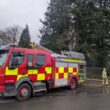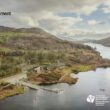Forty-five filling stations here were found to be selling illegal fuel during the past year, it has been revealed in the Assembly.
But the figure is not as high as earlier suggestions issued to the press via HM Customs and Revenue, according to Justice Minister David Ford.
The revelation came this week during the course of a debate on laundered fuel initiated by Newry and Armagh DUP MLA William Irwin, who had asked the Minister if he believed current legislation was strong enough to deter a filling station operator from acquiring and knowingly selling laundered fuel.
The Minister said fuel excise evasion and the related legislation was a reserved matter and is the responsibility of HM Revenue and Customs and the Treasury.
He told the Assembly: “Between February and May this year, HMRC consulted on a discussion document relating to penalties, which is the first stage in a wider review aimed at making it hard for a dishonest minority to cheat the system, including, of course, filling stations selling illicit fuel.
“In addition, they are continuing to look at legislative issues regarding naming and shaming filling stations where laundered diesel has been found: something that I have been pursuing with them.
“My Department and HMRC are organising a seminar on fuel laundering to be held in June. It will involve all relevant agencies and will be a forum to discuss whether there are areas in which more can be done.”
Mr Irwin responded saying, given that a “fairly recent survey identified that up to 50% of filling stations in Northern Ireland were selling laundered fuel, does he feel that legislation is in place to deal with the problem?”
The DUP representative said that naming and shaming filling stations was one thing, but “surely it is a criminal offence to sell illicit fuel?”
Minister Ford replied: “Yes, of course it is a criminal offence, and prosecutions are the responsibility of HMRC.”
But he warned Assembly Members that they needed to be careful when quoting the number of filling stations that may be committing this offence.
He added: “That was not particularly helped by a press release issued some time ago by HMRC that referred to the number of filling stations involved in selling laundered fuel, as opposed to the number of occasions on which detections had been made.
“The number with multiple offences means that the number of filling stations that have actually been engaged in that process is significantly lower.
“My understanding is that, in the last two years, the number of individual retail sites that were found to be in possession of illicit fuel were 33 in 2013-14 and 45 in 2014-15 – a lot less than half.
Sinn Fein MLA Sean Lynch asked the Justice Minister if he was satisfied that all necessary steps are being taken to ensure that only legal diesel is being sold at filling stations.
“No,” replied Mr Ford. “That is why I am in constant contact with the Treasury to seek to ensure that action is taken robustly. There are issues around the confidentiality of individuals’ tax returns that are entirely different from protecting the public where illicit fuel is being sold in petrol stations.
“That may happen even where the nominal ownership of a petrol station may change hands, leaving individuals vulnerable even if there are prosecutions against those who perpetrated the crime in the first place. I believe that a lot more needs to be done and I will continue to pursue it with the Treasury.”
Ulster Unionist MLA Sandra Overend said it was a “very serious issue” and was ongoing even in her own Mid-Ulster constituency.
“Can the Minister state what impact the National Crime Agency (NCA) being able to operate in Northern Ireland is likely to have on measures to break up the criminal gangs responsible for fuel laundering?,” she asked.
The Minister explained that on the specific issue of non-devolved crime, which includes evasion of excise duty, there was no additional benefit, although “we are aware that gangs that launder fuel are also engaged in other varieties of crime, some of which is a devolved matter”.
He said therefore, that he had no doubt that, when the NCA becomes operational, it will “add to our overall fight against organised criminals generally”.
The SDLP’s Joe Byrne Will asked Mr Ford what discussions had taken place with the mainstream oil companies who import oil here.
And he enquiried: “What advice does he have for those who want to run a legal filling station but who cannot compete with the contraband sellers?”
The Minister said he had not had direct discussions, but would shortly be having discussions with those who operate in the legal trade.
He stated: “Mr Byrne makes an entirely valid point about ensuring that people are able to support only those selling legitimate fuel. One of the key issues, of course, is the fact that the new marker is now in place. That makes it significantly easier to ensure that the fuel cannot be laundered without considerable expense.
“I think that that will certainly assist in the fight against organised criminals. Certainly, within a very short time, all diesel sold across the UK and Ireland will have the new marker in it. That is a key area.
“The fact that we are having not only our own conference but a Europe-wide conference in Northern Ireland this year is an indication that we are leading the fight.
“However, we clearly need to ensure that we use every possible means, and I believe that naming and shaming will be a key part of that.”
Read more news:
Three men in white van involved in two county Armagh thefts
Women charged with possessing class A, B and C drugs
Police provide proof of arresting reptile performance!
Man registered as farmer to rake in over £200,000 in VAT refund



